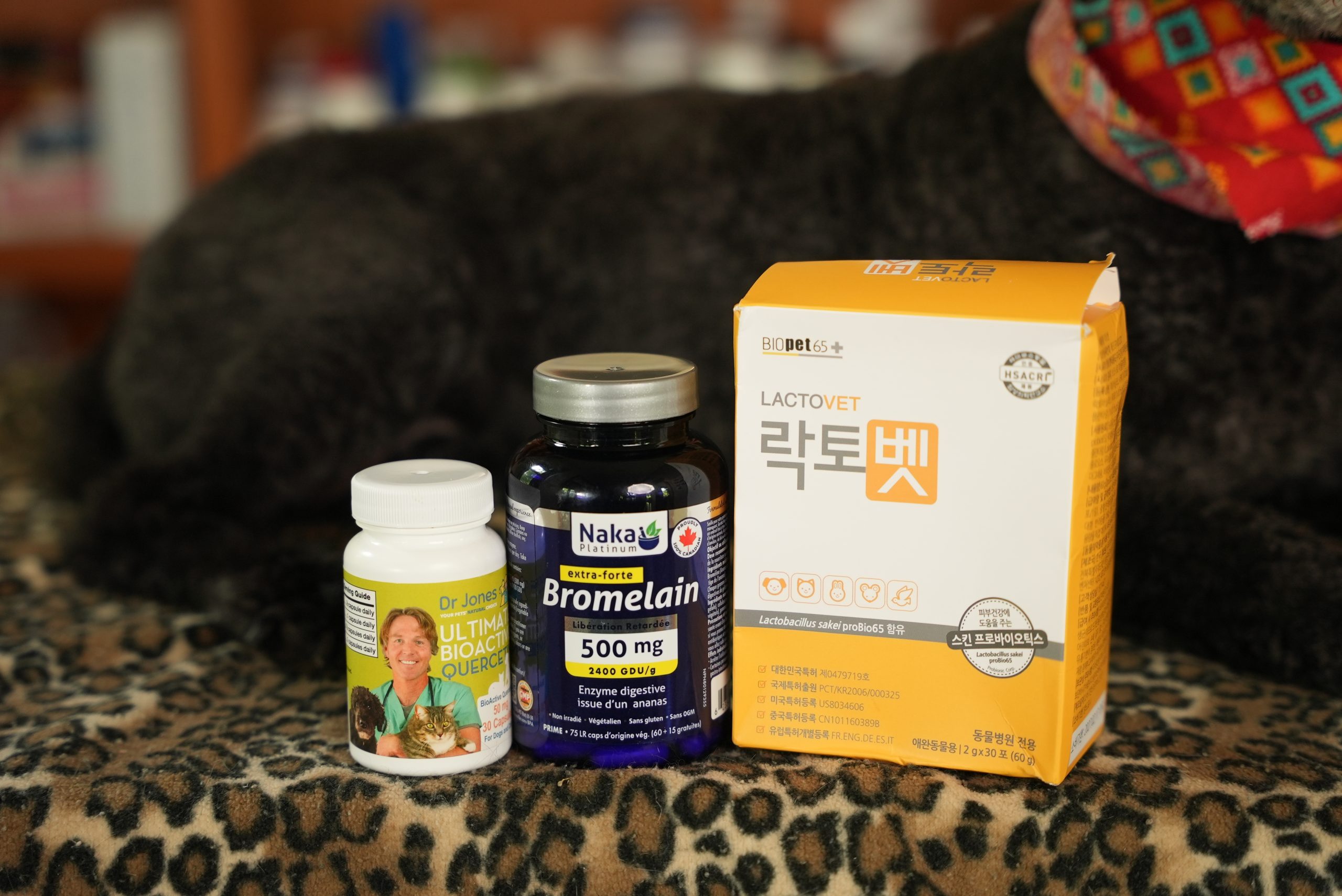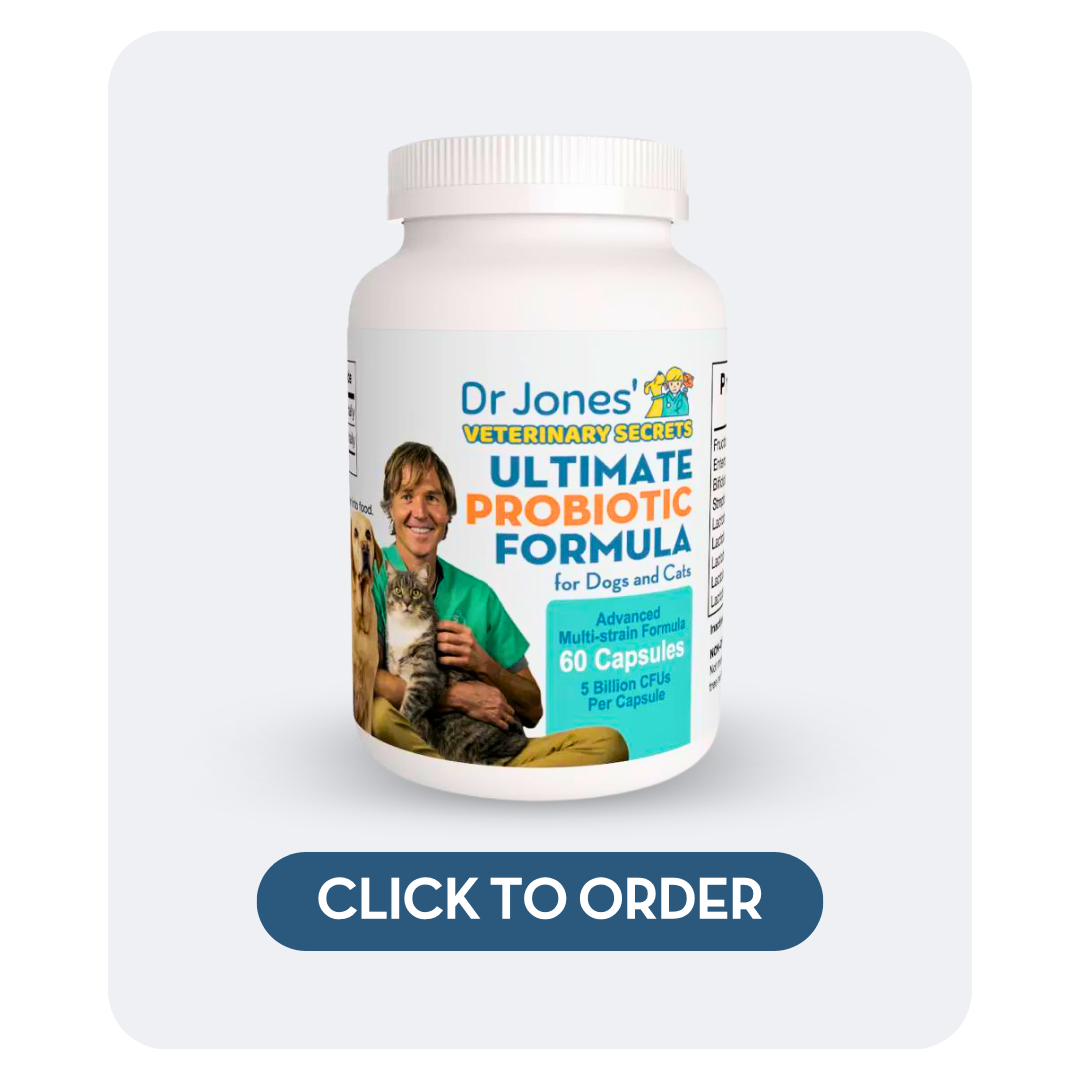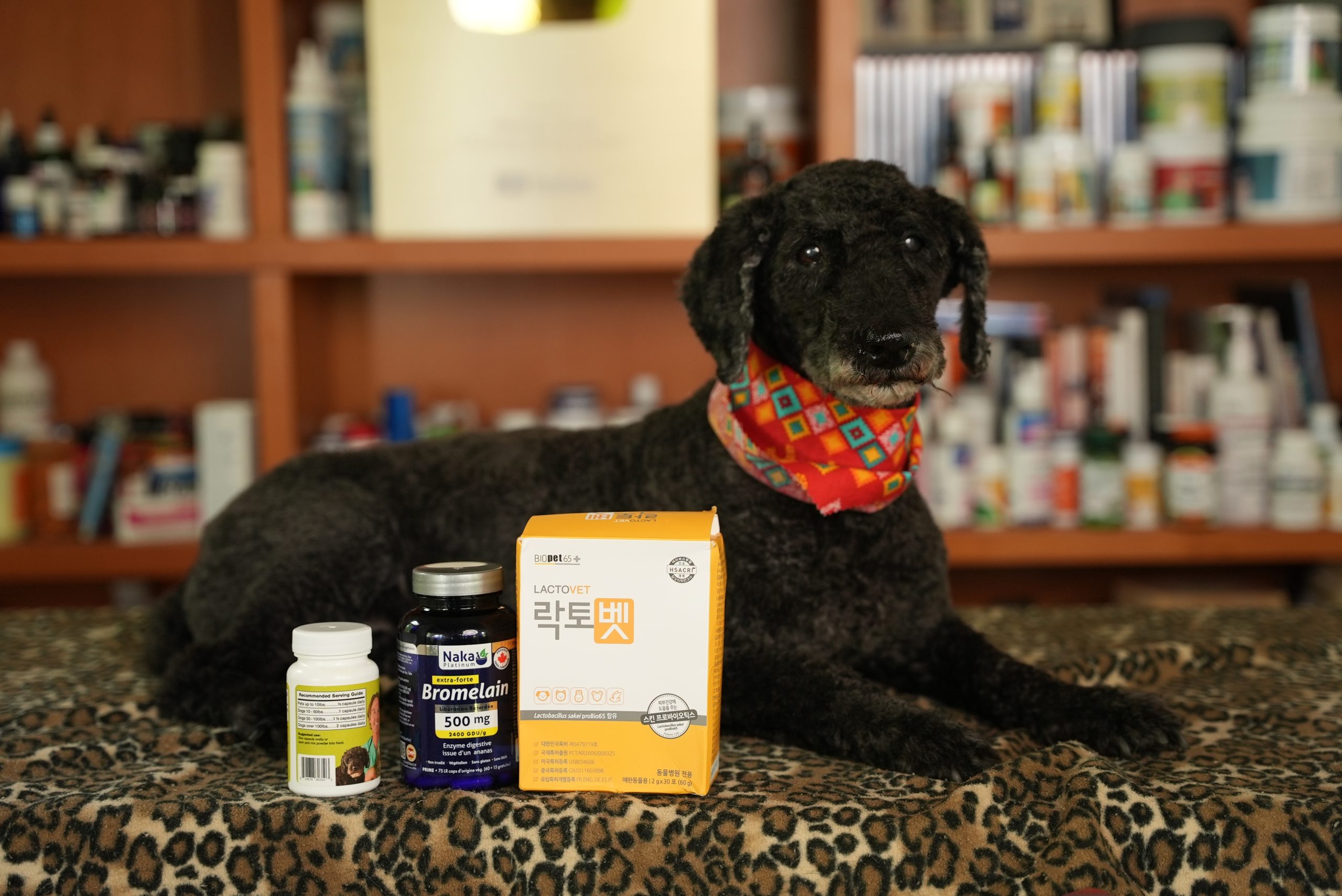3 Natural Treatments for Pet Allergies Backed by Science
![]()
3 Natural Treatments for Pet Allergies Backed by Science
Struggling with a pet that constantly scratches, licks, or suffers from skin irritations? It might be allergies, and finding the right solution can be a challenge. But what if I told you there are three natural remedies—backed by science—that could potentially bring lasting relief for your furry friend? In this article, I’m diving into the latest findings on Lactobacillus sakei, quercetin, and bromelain, and how they can work together to tackle those pesky allergy symptoms. Ready to see your pet feel better? Keep reading!
Dr. Jones’ Ultimate BioActive Quercetin for Dogs and Cats
Struggling with a pet who can’t stop scratching or licking? It could be allergies, and I’ve got three natural remedies that might just do the trick. In this article, I’m diving into Lactobacillus sakei, quercetin, and bromelain, and how they can help tackle those stubborn allergy symptoms.
Quercetin is one of the most effective natural solutions I’ve found. This powerful antioxidant has worked wonders for my brother’s allergic Border Collie, Angus. That’s why I’m excited to share Dr. Jones’ Ultimate BioActive Quercetin for dogs and cats—an easy, natural way to help your pet find relief. Curious? Keep reading to learn more about these game-changing remedies!

We now offer two formulations of Quercetin supplements:
For Big Dogs: Dr. Jones’ Extra Strength Bioactive Quercetin for Dogs and Cats
For Small Dogs: Dr. Jones’ Bioactive Quercetin for Dogs and Cats
These supplements have worked wonders for many dogs, including Angus, and can help relieve allergy symptoms naturally without the need for harsh medications. By addressing the root cause of your dog’s itching, and with the right natural remedies, you can help your furry friend find relief without relying on medications that come with side effects.

Natural Solutions for Your Pet’s Allergies: Three Remedies You Should Know
If you have a dog or cat dealing with allergies, you’re probably all too familiar with the struggle. You’ve tried different remedies, yet nothing seems to make a real difference. Well, I’ve got some exciting news. There are three natural remedies that, when used together, could potentially bring relief. Let me walk you through them.
Common Allergy Symptoms in Pets
If your pet suffers from chronic itching, frequent ear infections, head shaking, bad odors, excessive hair loss, or constant paw licking, it’s likely they have some form of environmental allergies. This can be a tough problem to tackle, whether you’re going the conventional medication route or trying holistic treatments. However, after attending a pet product trade show recently, I came across some new, promising alternative treatments. Among them, two in particular stood out, backed by solid research, and I think they’re worth trying.
Lactobacillus Sakei Probiotic
Let’s start with a probiotic called Lactobacillus sakei (also known as Probiotic 65). It’s derived from kimchi, a traditional Korean food, and has shown impressive results in treating atopic dermatitis in dogs—this is a skin condition related to allergies. A double-blind, placebo-controlled study on this probiotic found that it significantly reduced the severity of allergies in dogs, cutting down on itching and inflammation.
In fact, when compared to a potent steroid like dexamethasone, the dogs treated with Lactobacillus sakei showed better clinical results in improving their skin condition. This probiotic works by:
-
Modulating the immune system: Allergies are essentially an overreaction of the immune system, so by regulating it, the probiotic helps prevent that overreaction to allergens like pollen.
-
Reducing inflammation: It decreases skin redness and irritation, which are common symptoms of allergic reactions.
-
Strengthening the skin barrier: A strong skin barrier prevents allergens from penetrating the skin and triggering the itch-scratch cycle.
For dogs, a typical dose is between 1 to 5 billion CFUs (colony-forming units) per day. This probiotic comes in a convenient powdered form that can easily be sprinkled over your pet’s food once a day. For my dog, Tula, she would happily consume this mixed with her canned food. I’ve been really impressed with the results I’ve seen from this probiotic, and I’d highly recommend it if your dog is struggling with environmental allergies.
Quercetin
Next up is quercetin, a flavonoid found in many fruits, vegetables, and plants like kale. I’ve mentioned quercetin before, and we even have a supplement for it. This compound is a natural antihistamine, which helps reduce histamine release in your pet’s body, ultimately decreasing itching. Quercetin also has anti-inflammatory properties, which help with the redness and swelling often seen in allergic reactions.
However, the key to quercetin’s effectiveness is getting it properly absorbed. If it doesn’t get absorbed, it can’t work. That’s where bromelain, our third remedy, comes in.
Bromelain
Bromelain is an enzyme found in pineapples, and it has multiple benefits, including anti-inflammatory properties. It’s also known for its ability to improve the absorption of other supplements, like quercetin. By breaking down proteins in the digestive system, bromelain makes it easier for quercetin to be absorbed into the bloodstream and do its job.
In addition to helping with allergies, bromelain is also useful for pets with digestive issues, such as chronic vomiting or diarrhea. It’s also been shown to help with inflammation related to arthritis, making it a versatile supplement for pets with a variety of conditions.
How to Use These Remedies
For a dog weighing around 20 pounds, I recommend giving:
-
50 mg of quercetin per 15 lbs of body weight daily (for Tula, I’d use two 50 mg capsules).
-
5 mg of bromelain per pound of body weight (so for Tula, about 100 mg per day).
You can sprinkle the bromelain into your pet’s food along with the quercetin. I suggest using this combination for at least 30 days, but 60 days is ideal to see the full benefits.
My Thoughts
If you’re dealing with a pet who has allergies and nothing else has worked, I strongly encourage you to try Lactobacillus sakei, quercetin, and bromelain. I’m confident these remedies will make a noticeable difference for your dog or cat, especially when used together.
Thanks for reading! If you’d like to learn more about natural solutions for your pet’s health, don’t forget to subscribe to Veterinary Secrets and hit the bell for notifications. You can also check out the link below for a copy of my free book on pet health.
Final Thoughts
These three remedies—Lactobacillus sakei, quercetin, and bromelain—are powerful tools in the fight against your pet’s allergies. They offer a natural, science-backed alternative to conventional treatments, and I believe they could make a real difference for your furry friends.

Dr. Jones’ Ultimate BioActive Quercetin for Dogs and Cats
Struggling with a pet who can’t stop scratching or licking? It could be allergies, and I’ve got three natural remedies that might just do the trick. In this article, I’m diving into Lactobacillus sakei, quercetin, and bromelain, and how they can help tackle those stubborn allergy symptoms.
Quercetin is one of the most effective natural solutions I’ve found. This powerful antioxidant has worked wonders for my brother’s allergic Border Collie, Angus. That’s why I’m excited to share Dr. Jones’ Ultimate BioActive Quercetin for dogs and cats—an easy, natural way to help your pet find relief. Curious? Keep reading to learn more about these game-changing remedies!
We now offer two formulations of Quercetin supplements:
For Big Dogs: Dr. Jones’ Extra Strength Bioactive Quercetin for Dogs and Cats
For Small Dogs: Dr. Jones’ Bioactive Quercetin for Dogs and Cats
These supplements have worked wonders for many dogs, including Angus, and can help relieve allergy symptoms naturally without the need for harsh medications. By addressing the root cause of your dog’s itching, and with the right natural remedies, you can help your furry friend find relief without relying on medications that come with side effects.












L sakei sounds great! Where can I buy it? I live in Ontario, Canada.
Thanks for your help Dr. Jones
You can try Amazon or other online stores.
This sounds so interesting! Do you know if it can be given to horses?
Yes, some of the natural allergy treatments Dr. Andrew Jones recommends for dogs may also be suitable for horses, but always consult your veterinarian before introducing any new supplement or remedy to your horse’s diet.
For instance, quercetin, a natural antihistamine, is commonly used in dogs at a dosage of 50 mg per 15 lbs of body weight. While it’s effective for dogs, its safety and efficacy in horses haven’t been extensively studied. Similarly, stinging nettle is another natural antihistamine used in dogs, but its use in horses should be approached with caution and professional guidance.
It’s important to note that horses have different digestive systems and metabolic rates compared to dogs, so dosages and the safety of certain substances can vary significantly. Additionally, some natural remedies that are safe for dogs may not be safe for horses. For example, certain herbs like garlic and chamomile can be toxic to horses. Therefore, it’s crucial to seek advice from a veterinarian experienced in equine care before administering any new treatments.
Is the l-sakei safe for horses?
I know with humans, this probiotic can be put directly into the nose. Can the same be done with dogs?
Administering probiotics directly into a dog’s nose is not a standard practice and should be approached with caution.
Have you got any other ideas to give my chihuahua for a grade 6 heart murmur. As the tablets I’ve been give is a nightmare to give her as she is a very picky dog.
For your picky chihuahua with a grade 6 heart murmur, consider these natural supplements:
Hawthorn: Supports heart function and circulation.
Coenzyme Q10 (CoQ10): Enhances heart muscle energy and function.
Omega-3 Fatty Acids: Reduce inflammation and support heart health.
CBD Oil: Offers anti-inflammatory and calming effects.
Check our supplements here:
https://shop.veterinarysecrets.com/
For nasal congestion, how long until you see some relief after using this product? Will you see a reduction in a crusty nose as well? Thanks.
The product is administered orally, making it easier to use compared to traditional nasal drops. While the exact duration for relief can vary depending on the severity of the symptoms, some pet owners have reported noticeable improvements within a few days of consistent use.While it may help alleviate some symptoms associated with a crusty nose, such as nasal discharge, it may not directly address the underlying causes of crustiness.
Hello Dr. Jones. I’d like to know where i can buy Dr. Jones’ Ultimate BioActive Quercetin in Italy? Thanks
We do ship all of our supplements internationally, however some countries do not allow CBD products and certain pet health products. You will have to check with your country’s international customs policies before ordering.
For shipping costs for Dr. Jones’ supplements, you can find an estimate by adding a jar of the supplement to your cart, and once you are in your cart, scroll down below the cart and you’ll see “Estimate Shipping and Tax”. Just enter your basic shipping details (Country, etc) and click “Get a Quote” and you’ll see the available options.
https://shop.veterinarysecrets.com/supplements/dr-jones-ultimate-bioactive-quercetin.html
How much is each bottle I have 3 med dogs
Given that your three medium-sized dogs each require approximately 1 capsule daily, one bottle would last about 10 days for all three. Therefore, for a 30-day supply for all three dogs, you would need to purchase approximately 3 bottles.
For more details and price lists:
https://shop.veterinarysecrets.com/supplements/dr-jones-ultimate-bioactive-quercetin.html
Hello Dr Jones!
Are these 3 components ONLY given once daily?
Yes once daily.
Hello Dr. Jones,
I have a medium sized Golden Retriever who has a very sensitive stomach. I believe she has chicken allergies as well. I only give her kibble which she tolerates very well, however, she still occasionally gets into other things when I’m not looking. Last weekend she got into another dogs food which contains chicken and I’ve been dealing with chronic diarrhea since. She has negative results from stool sampling done yesterday and I have since put her on probiotics 3 days with no relief yet. I don’t want to use Metronidazole, even though she responded well to it previously, for her if I don’t have to. I’m looking for the most natural way for anti-inflammatory gut health as I’m not convinced that the probiotics I’m using are effective. Any recommendations are greatly appreciated. Thank you in advance.
Gut inflammation and diarrhea in dogs:
Bland diet: Lemon-free, chicken isn’t ideal if allergic. Try easily digested proteins like boiled turkey or fish with plain rice
Pumpkin or sweet potato: Plain canned pumpkin (not spiced) or cooked sweet potato adds fiber to firm stool and soothe the gut
Bone broth: Homemade bone broth helps with hydration and gut healing — rich in gelatin, minerals, and easy to digest
Slippery elm and marshmallow root: Both herbs form a protective coating in the digestive tract to reduce inflammation and calm irritation
Chamomile or ginger tea: Chamomile can soothe cramps; ginger may reduce nausea and inflammation
High?quality, dog?specific probiotics: Purina?FortiFlora or similar supplements with strains like Enterococcus faecium can help restore gut flora—though results vary, there’s evidence for benefit in acute diarrhea cases
You may also visit our related articles:
https://veterinarysecrets.com/?s=diarrhea
Where can I buy this. Amazon only has the 150 billion not 1-5 billion like Dr. Jones recommends. Can’t find other sites either. Do you know of a specific brand? Thanks
You can purchase our BioActive Quercetin here:
https://shop.veterinarysecrets.com/supplements/dr-jones-ultimate-bioactive-quercetin.html
I have been looking for this L-Sakei 65 to give to my dog. Do you make a formula that contains Bromelin, Quercitin and L-Sakei 65? What is the name of it if you do?
Thanks